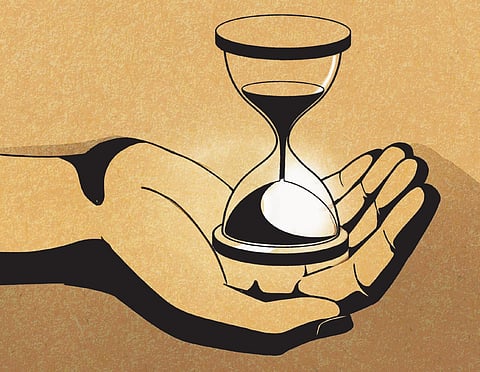4,000 Weeks is the Time You Have
I recently lost someone close.
I had seen him a week ago, and he seemed happy. We exchanged hugs and promised to meet in December. His sudden death got me thinking about how we often take for granted the time we have with people and projects we care about.
Unless something tragic happens, it is a reasonable expectation to live up to 70-odd years. That seems like a long time until it isn’t. Author Oliver Burkeman nudges us to think of life in weeks, not years. 4,000 weeks is what we have. Hopefully, these five techniques will help put things in perspective:
1. Prioritise the important over the urgent.
Indiscriminate action is a form of laziness. Treating everything on your plate as equally important is the opposite of productivity. It takes time for anything worthwhile to blossom, so let the 4,000 weeks you have be about the handful of things you intrinsically care about. There may be hundreds of small decisions you need to make in a day, but only one or two important ones matter in the long run.
2. Remember that distraction comes from within
Focusing on important stuff is easier said than done. There are innumerable tempting distractions that can lead us astray. Poet Mary Oliver calls distraction “the intimate interrupter”. She says, “But just as often, if not more often, the interruption comes not from another but from the self itself, or some other self within the self that whistles and pounds upon the door panels and tosses itself, splashing into the pond of meditation. And what does it have to say? That you must phone the dentist, that you are out of mustard, that your uncle Stanley’s birthday is two weeks hence. You react, of course. Then you return to your work, only to find that the imps of idea have fled back into the mist.”
Turns out that we often want to distract ourselves when we are in the middle of a creative project or a difficult conversation. Doing stuff that matters requires concentration and facing up to uncomfortable truths. We may realise that we don’t have the talent or focus or willingness to pull through. Instead of accepting that truth, finding solace in digital space gives us temporary relief. We collaborate willingly because it is easier to blame it on distraction than on something more fundamental.
In a way, it could be nature’s way of protecting us from self-loathing or self-pity. Be that as it may, it is worthwhile to remember the signals from our intimate interrupter. If we make distraction a default excuse, we might be left with a lingering regret—what if we gave it a full-throttled try?
3. Patience is a superpower
Art historian Jennifer Roberts suggests that patience is a way to exert influence on the world. She asks her students to look at a painting for three hours at a stretch. The time span is explicitly designed to seem excessive. Also crucial to the exercise is the museum or archive setting, which removes the student from his or her everyday surroundings and distractions. After an hour of intense discomfort, students begin to develop a deeper understanding of the subject.
It is useful to try and adapt Roberts’s practice to our daily lives. Clarity often comes from paying attention, not seeking it.
4. Plans change and that’s ok
Planning is often seen as a way to impose order on the chaos of life, but Burkeman warns against viewing plans as guarantees of certainty. The future is inherently unpredictable, and while planning is useful, it’s essential to remain flexible and open to change. Jiddu Krishnamurti’s philosophy, “I don’t mind what happens,” encapsulates this mindset.
5. Don’t measure your life in metrics
A sure-shot way to be miserable is to think that success in life comes from metrics like net worth, fame or awards. 4,000 weeks on earth in search of elusive metrics seems like a waste of time. You should, of course, try to work as hard as you want, and if achievement is what makes you happy, so be it. That said, let it be about what you intrinsically want and not about how it stacks up with others.
Martin Heidegger once said, “If I take death into my life, acknowledge it, and face it squarely, I will free myself from the anxiety of death and the pettiness of life—and only then will I be free to become myself.” By thinking of our lives in terms of 4,000 weeks, many of which may have already passed, we gain a powerful lens to reassess our priorities and live more authentically.
Utkarsh Amitabh
CEO, Network Capital; Chevening Fellow, University of Oxford
Posts on X: @utkarsh_amitabh

